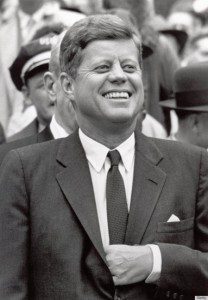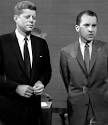
Like many, I have watched the retrospectives on TV and read the features in the weekend papers about the assassination of President John F. Kennedy 50 years ago this week. I can remember where I was and how devastated I felt. But, while most are focusing on the tragedy of Nov. 22, 1963, I prefer to look at the triumph of Sept. 26, 1960. There on our modest black-and-white TV screen appeared the two giants of American politics in a Chicago studio with moderator Howard K. Smith in between.
“The television and radio stations of the United States,” Smith began the evening telecast, “are proud to provide a forum for discussion of issues in the campaign between the two major candidates for President of the United States.”
To Smith’s right on the screen (and politically) sat then Republican Vice-President Richard M. Nixon. To his left on the screen (and otherwise) sat Democratic Senator John F. Kennedy. This night – sometimes referred to as the first Great Debate – pitted the leading contenders for the most powerful job in the world, in front of a television audience estimated to number 75 million people.
It proved to be a defining moment when television began to dominate politics. It also marked the moment in modern history when a political candidate who recognized the full power of the medium took command of the screen and defeated his opponent not so much by what he said, but by the way he looked.

But this was no accident. At the time, Senator Kennedy had recently taken his presidential campaign to the Pacific west coast. Thus, he had arrived in Chicago looking tanned, healthy and focused on the job at hand. Indeed, Kennedy had spent the bulk of the day holed up in a Chicago hotel answering a battery of questions from his handlers in preparation for the debate.
Meanwhile, Nixon had been out canvassing right up until the last moment. He looked pale, drawn and arrived at the studio for the broadcast just moments after his last public appearance. American TV producer and Great Debate director Don Hewitt told CBC documentarian Mark Starowicz how each of the two candidates approached the evening’s televised contest.
“At one point, I looked at Nixon on camera and he looked like death warmed over,” Hewitt said. “I said to Kennedy, ‘Would you like some makeup?’ And he said, ‘No I don’t want any makeup.’ Nixon overheard that and said, ‘I don’t think I want any makeup either.’ He needed it.”
Nixon’s choice not to reduce the effect of the hot studio lights and his light skin’s tendency to perspire and shine as a result made Nixon appear nervous, stressed and not very presidential. Nixon had also chosen to wear a neutral grey suit, which made him disappear into the grey studio background. In contrast, Kennedy wore a blue business suit, which helped the upstart candidate stand out from the cyclarama in the back of the studio.
“Had Nixon worn makeup that night,” Hewitt contended, “he might have won that debate. That’s a terrible thing to ponder. That a man running for President of the United States runs his ship aground over his refusal to wear some pancake makeup.”
But it was more than style that earned John F. Kennedy the victory that night in Chicago. During the debate, Richard Nixon, a seasoned debater from years of verbal jousting in Congress, kept shifting his view between looking at the camera and looking at Kennedy. Meanwhile, either on the advice of his braintrusters or by pure instinct alone, Kennedy looked straight into the camera lens during the debate, appearing to ignore Nixon all together. His choice was clear: talk to Nixon or talk to the 75 million Americans tuning in.
“In the end,” JFK’s press secretary Pierre Salinger told the CBC, “the majority of people who saw the debate believed Kennedy had won the debate. The majority of people who heard the debate (hadn’t seen it) thought Nixon had won.”
History showed that John F. Kennedy’s margin of victory in the presidential election a few weeks later was just .01 per cent. He had illustrated the impact that televised debates would have on modern politics from then on. But John F. Kennedy had also illustrated how a man who looked presidential could command the screen, capture the public’s imagination and convince it of his political convictions.
Another broadcaster of the day, John Chancellor of NBC TV News, called Kennedy “a swashbuckler… He was so confident. That’s why he did so well. And that’s why he knew he could survive the dangers of live television.”
Ironically, John F. Kennedy’s confidence and ease in mingling with the public, may have hastened his demise. His attitude of being ever willing to reach out and face his constituency may have ultimately exposed him to the kind of risks that in the volatile 1960s cut him down prematurely.